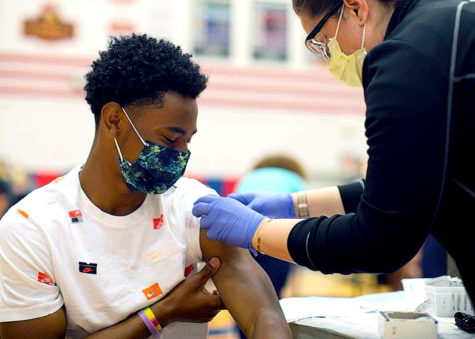Vaccine Mandates Won’t Help Vaccination

All over social media, students have been flaunting their COVID-19 vaccination cards to show off their new freedom and safety from the virus. Not all have been vaccinated, however, due to a wide variety of reasons. Thus, as hundreds of universities and workplaces are implementing vaccine mandates, many are wondering if public schools should also be considering one to ensure the safety of their students and faculty when we return in the fall, lest a critical mass of unvaccinated students come to school and threaten the community’s safety. Although it is certainly crucial to maximize the number of vaccinated students, Boston Public Schools (BPS) should not require students to get vaccinated in order to come to school as it will cause too much backlash; it should instead give students incentives as a more effective method of driving up vaccinations.
While the vaccine does not eliminate the virus, it prevents individuals from contracting and spreading COVID-19. In fact, according to Dr. Gypsyamber D’Souza of the John Hopkins Bloomberg School of Public Health, as long as 70 percent of the population is vaccinated, the country can achieve herd immunity, which all but guarantees infections will stay low. Fortunately, USA facts reports that 65 percent of those living in Massachusetts have received at least one dose and 50 percent have received both shots — promising numbers indeed. As a growing number of individuals continue to get vaccinated, a vaccine mandate in Boston may not even be necessary.
On the other hand, the legality of a mandate for a public school system in the first place is still not a settled matter. While vaccine mandates themselves are legal, the COVID-19 vaccine has only been approved by the Food and Drug Administration for Emergency Use Authorization (i.e., it has not been through the complete, regular approval process due to the circumstances), and language within the policy allows people involved in public institutions, which might otherwise require vaccines, to refuse them as a result. This provides families with the grounds to reject a school mandate. Regardless of the legality, the more important discussion is on the morality and reality of a mandate.
Despite most researchers and government officials confirming that the vaccine is completely safe, many still have concerns about the vaccine’s negative health effects, while other groups may have fears due to centuries of racism in healthcare.
Cameron Kelley (III) finds that there are “very polarized opinions, as almost anything remotely politically related is today,” and many like him believe that “if the government [and public schools are] […] able to mandate vaccination for all people, that is just one step toward a more authoritarian government.”
Indeed, a Vox article corroborates that nearly a third of those who are unvaccinated cite distrust in the government and vaccine as reasons why they refuse vaccination. This combination of medical and government distrust will only cause families, who are already hesitant or neutral on receiving a vaccine, to react angrily against a mandate, as seen with mask and social distancing mandates.
Viviana Wallace (III) agrees that “people are still doing their research and are skeptical [of the vaccine] […] I was skeptical before, but now [that] I’m ful- ly vaccinated […] [I] think the vaccine is worth it.” Therefore, the best way to increase our vaccination rates is by allowing families to see its success in reducing hospitalization rates and voluntarily sign up, rather than forcing them to get the jab against their wishes.
In the case that vaccination rates are not high enough, BPS should consider an incentive system instead of punishment. Mr. Michael Galego, a biology teacher, explains, “For instance, if you are six feet apart and you are a vaccinated student, you can take your masks off indoors […] These incentives that we can offer to get people vaccinated seem to be a better way of encouraging people towards vaccination without the negative side effects of forcing a vaccine that they view as scary.”
Ultimately, BPS should allow families to make vaccination choices on their own as the majority already have or wish to get one. A mandate may only push the remaining families away from getting vaccinated instead of toward it.






